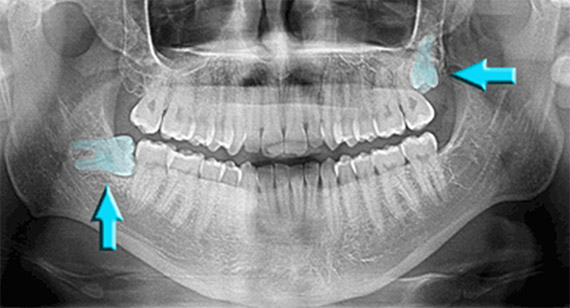Wisdom Teeth Extraction

January 26, 2018
You know those videos where the person is all loopy and says outrageous things that everyone laughs at? Yeah, those videos happen after someone gets their wisdom teeth removed. They use laughing gas and just as the videos show, they make many embarrassing memories.
Just recently I had mine removed and it sucked. Fortunately I chose the IV sedation so I didn’t have to see a video of me being crazy.
The paper that gave me post-op instructions said that days three and four would be the most painful, but they lied. For me days six and seven were the worst. I tried to plan my appointment to be during break so that I could just go back to school when break ended. However I think I just had a delayed pain reaction and ended up missing a week of school.
The prophylactic extraction of third molars is also known as wisdom teeth removal. There are many reasons why someone may need their wisdom teeth removed including that the teeth are impacted, which means they’re so far back in your mouth that they may not come in normally. They can be trapped in your jawbone or gums, which can be painful.
They could also be coming in at the wrong angle and may be pressing against your other teeth and could cause crowding. Also there isn’t enough room for wisdom teeth because our jaws don’t grow to be big enough to have enough space for them to come in. Since there isn’t enough room for them to erupt properly, wisdom teeth tend to come in at an angle or they don’t fully emerge, which causes problems for the rest of the mouth.
Lastly, you could have cavities or gum disease because it is more difficult to reach your wisdom teeth with a toothbrush or floss.
Most doctors push for early extraction when people are in their teens or young adult, rather than when they are older. They say that ages 17-25 are best because the roots are not fully formed and will have less complications during and after surgery.
After the surgery they give you a “DOs and DONT’s” list. Things included on the DO side include staying elevated the first three days, “Ice, Ice, Ice,” use moist heat for a sore jaw, gently open and close your mouth to exercise your jaw, eat soft foods like pasta, rice, or soup, drink plenty of fluids, brush your teeth starting the second day and take the drugs your doctor prescribes to ease pain or swelling.
The DONTs list includes drinking through a straw, eating hard, crunchy, or sticky foods that may scratch your wounds, smoking, spitting or swishing. If you stick to the list you should be good and not have any problems on your end. But, there are always risks when surgery is involved so there are times when complications and infections occur and people could end up in pain the rest of their lives.
Fortunately my procedure went well and I am healing just fine. On the other hand other people may not have had such a great experience. Many types of complications can occur and some people end up in pain for the rest of their lives because of it. Complications may include long-lasting numbness, a constant steady pain, jaw locking or damage to the adjacent teeth. I am glad to know that my procedure went pretty well and I didn’t have any major complications.